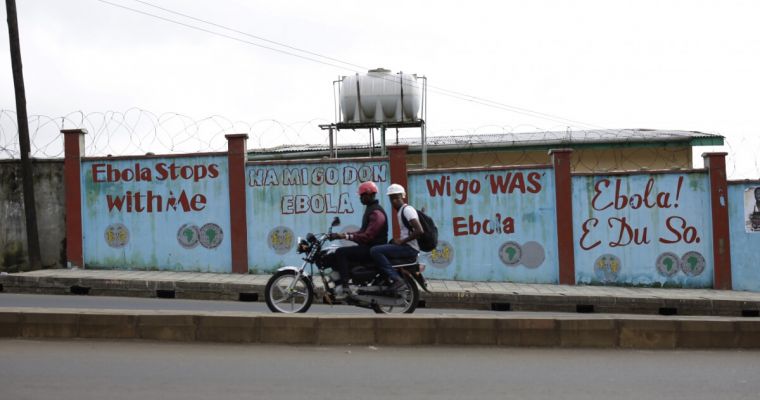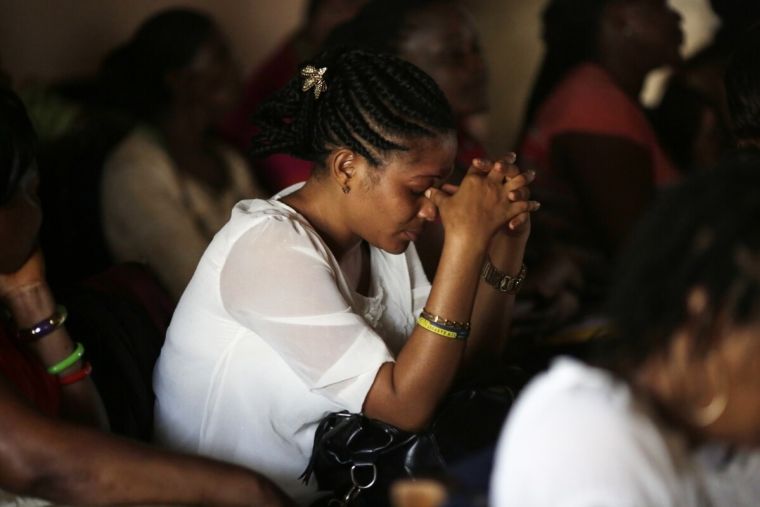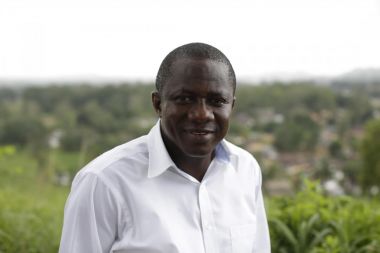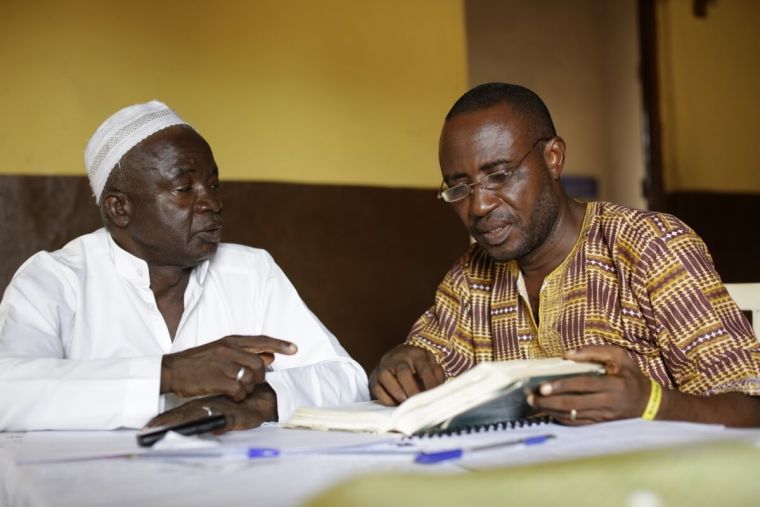How faith leaders became vital in the fight against Ebola
In June 2014, the World Health Organisation announced the first case of Ebola in Sierra Leone. Despite warnings from the government and the ministry of health, immense distrust of those in authority (following years of failed leadership and promises) and rumours that the disease didn't actually exist meant that precautionary methods and sanitary advice were rarely heeded by the general population. The virus spread like wildfire, and to date 3,955 people have died as a result in the country. Together with neighbouring Liberia and Guinea, the death toll has exceeded 11,000.

It's one of the defining humanitarian issues of Sierra Leone's recent history, and compared regularly to the civil war of 1991-2002 that left over 50,000 dead. Now over a decade since the peace deal was signed, Sierra Leoneans are beginning to open up about the harrowing things they saw and experienced during that time – and as the brutal history unfolds, the significance of its comparison with Ebola is overwhelming. One woman described the way that rebels ground up live babies in a palm oil drum, fried them and ate them as meatballs. Children were raped in front of their parents, abducted and forced to fight, and girls used as sex slaves. But Rev Shodankeh Johnson, who oversees more than 500 churches in Sierra Leone as head of mission for New Global Harvest Ministries, explained that when Ebola broke out, it really did feel like the war all over again. "Some people said this was an unseen enemy," he said. "In the war, the enemy was seen – you knew where the enemy was, and the enemy line. But here, there was no enemy line. The enemy could be in a friend."
During the initial stages of the outbreak, the number of cases grew almost exponentially despite government interventions, eventually reaching around 500 per month at the height of the crisis in November 2014. But then, something shifted, and the number of cases dropped dramatically – it suddenly seemed that the war against Ebola could be won. On Saturday 7 November 2015, 42 days since the last recorded case, Sierra Leone was declared free of the virus. So what bought about the change?
A country driven by faith
The influence of faith is everywhere in Freetown. Churches and mosques certainly don't dominate the skyline, but they are there – hidden among makeshift homes, or between shops whose colourful wares spill out onto the streets. Days start with calls to prayer, car stickers declare "Jesus is Lord" or "Allah is Great"; turn the radio on and you'll find several stations exclusively dedicated to worship.

Almost everyone in Sierra Leone identifies as a Christian or a Muslim; somewhere around 30 and 60 per cent respectively, though figures vary. A minority of Sierra Leoneans hold traditional beliefs and follow indigenous customs, but these are often – though not always – woven into the mainstream faiths. Religious leaders are therefore held in high regard, and are trusted by much of the population. "In Sierra Leone, people listen to their pastors and imams," one woman, Caroline, told me. "If they say don't do it, we don't do it. If they say do, we do."
It was this trust that triggered the shift in the war against Ebola. In October 2014, a coordinated effort to stop the virus began. Some faith-based initiatives had been rolling out before then, including inter-religious radio messages on Ebola prevention and control, the formation of an inter-faith task force and a meeting at the UN convened by the Council of Churches. But October was seen as the real turning point for faith leaders in Sierra Leone and it is then that the virus began to lose its grip. By December, suspected and confirmed cases had dropped to 400 a month. In February, the figure had fallen to just 200.
Ebola Denial

In the lead up to that time, the response from Christian and Muslim leaders in the country was not favourable. Some perpetuated the rumours that Ebola either didn't exist at all, or was introduced by the government as a way to extract money from foreign countries. Others believed that patients were taken away to be used by Westerners in cannibalistic rituals, and there was widespread mistrust of the influx of health workers who flew in to help. Prevention strategies such as avoiding bodily contact and not washing or touching dead bodies were therefore largely ignored, and fear of alien-looking medical practitioners in their protective suits meant that people hid their dead and sick relatives rather than contacting the authorities. I even heard about an ambulance driver who contracted Ebola from a patient he was trying to deliver to the hospital. Terrified, and not knowing where she was being taken, she spat in his eye. He later died.
"The biggest problem when Ebola started was absolute denial," Rev Shodankeh told me. "Around 80 per cent of the population did not believe that Ebola was real...There were highly educated people, professors and intellectuals, who were in total denial. I saw it from the most illiterate to the most educated."
Some Christian and Muslim leaders also taught the message that Ebola was a curse from God, sent as revenge for man's sinful depravity. In Liberia, where over 4,800 people went on to die from the virus, the Council of Churches released a statement in July 2014 that branded Ebola a plague, and urged Liberians to pray and seek God's forgiveness. The stigmatisation of Ebola patients and their relatives ensued, as religious people sought to distance themselves from those they believed to have been punished by God.
As this narrative was spread by religious groups, the government sought to counter it with its own campaigns, but largely failed. It's widely agreed that Sierra Leoneans don't trust their government, and something of this can be seen in the way that Freetown is built. While the mosques and churches are embedded in the communities they serve, the government buildings and presidential State House stand tall; whitewashed and separated. There's no doubt that the authorities tried to eradicate Ebola, but they were largely powerless when it came to reaching the population.
The turning point
Without the backing of faith leaders, therefore, the effort to end Ebola was wasted. In September 2014, the UN's special envoy for Ebola said that "churches and faith-based organisations have a massive role to play in dealing with emotional, psychological and spiritual aspects of people's lives, engaging them on questions of life and death." It became apparent that harnessing the power and influence of faith leaders was vital, and as they were bought on board, the statistics began to change.

Two of the major groups involved in this process were interfaith action groups CHRISTAG and ISLAG. I met Rev Emmanuel Famah and Sheikh Alhaji Bakar Kowa at the United Brethren in Christ Church in central Bo, about 100 miles west of Freetown. They had worked together before Ebola broke out, but are adamant that the crisis has bought them, and consequentially their communities, closer together over the past year. When they sat down to talk on a blisteringly hot day, Kowa greeted his Christian counterpart with a wide smile and a call of "Hallalujah!" "Hallalujah, Asalaam Alaykum," Famah responded. "Asalaam Alaykum, Amen."
The strength of their relationship was evident as we spoke, and both shared eagerly about the way that churches and mosques changed their practices in keeping with the Ebola precautions. Christians stopped sharing the peace by shaking hands or hugging during church services, sat further apart from one another in the pews and began using individual cups during Communion. Even worship was more subdued to prevent people from sweating, and Muslims also stopped embracing each other when they gathered. The government banned meetings of five or more people other than for services at churches or mosques, but there was a three week period when even these were forbidden; an unprecedented move, and difficult for a country so reliant on faith. "Ever since I've been born, even during the rebel war, there had always been church services," Famah said. Pastors continued to engage with their flock, however; Rev Thomas Bindi, Evangelical Fellowship of Sierra Leone (ESFL) coordinator for the Waterloo area near Freetown told me that some local church pastors sent their sermons out via text message, or posted on Instagram. There was even talk of developing an app to disseminate messages more easily, but then churches reopened and it was deemed unnecessary.
With all the fear surrounding Ebola, lots of people were too afraid to come to church even when it was considered safe. In many communities, pastors began to reach out to those who had stopped coming on Sundays; Johnson said there was a significant worry that churches would lose their core if the congregation dropped away permanently. "For many of us, it was about trying to overcome fear with faith," he said. "There was an undercurrent of fear in the hearts of pastors that this might destroy what the Church really stands for."
The Church, however, should always be a place of hope, Johnson said. "When we had the war in this country, the churches were able to come together and play a vital role, but Ebola also created a platform for churches to come together and strategise, and really bring a message of hope."
Part of this was, once again, about learning to work alongside Muslim leaders. "Ebola was not only attacking Christians or Muslims, it attacked both parties and both religions, so we decided if we were going to be serious about this, we needed our brothers on the other side. We needed to sit down and talk," Johnson said. Meetings were held between pastors and imams all over the country, and a coordinated effort to end Ebola began. Messages from the churches and mosques encouraged their congregations to seek medical help immediately in cases of suspected Ebola, and dismissed the rumours that were running wild. "As leaders, we said: 'If we don't raise awareness, who will suffer most? Most of these people are in our churches or in our mosques; something needs to happen.'"
A brighter future
While Ebola has devastated Sierra Leone, it is hoped that the radically improved inter-religious relations could mean a brighter future for the nation. Johnson said the pastors and imams who met in those meetings now visit one another, exchange gifts, and share meals. "This never happened before," he told me. "Ebola itself really brought us together, and it also gave us a common identity...This is about Sierra Leone, it is not about religion, let's fight as Sierra Leonians."
It is this sentiment that sparks the brightest hope. Both Christian and Muslim leaders repeatedly told me of their renewed energy for working together to aid community development across Sierra Leone, and to use their platform to initiate engagement with the government on issues that affect local communities.

When the anti-Ebola measures first came in, dead bodies were sprayed with chlorine and unceremoniously disposed of by removal teams. No thought was given to what this would mean in a culture which deeply values its dead. Once faith leaders explained why caring for, washing and praying over the dead bodies was so important, health agencies made provisions for safe and dignified burials. It was a huge step in ending transmission of the virus.
"I believe this should be a precedent going down the road...We wrote to the government and said that in the future, the government has to take religious people very seriously," Johnson said.
"A lot of faith leaders were very frustrated, because many of them think we were never consulted, no one ever bothered to really talk to us about any issues...But we were able to encourage a lot of religious leaders that we don't need to be invited; we have to take the step forward.
"I said to a lot of my colleagues the problem has been that you are waiting for someone to invite you, but you can initiate and start the process. So I think that is a paradigm shift in the minds of a lot of religious leaders, that in the future they're not going to wait for an invitation, they are going to stand out there, see what they can do, and begin to speak out."
Carey Lodge was in Sierra Leone with Tearfund, who have been working with partner organisations in the country throughout the Ebola crisis. All photos: Layton Thompson for Tearfund.











